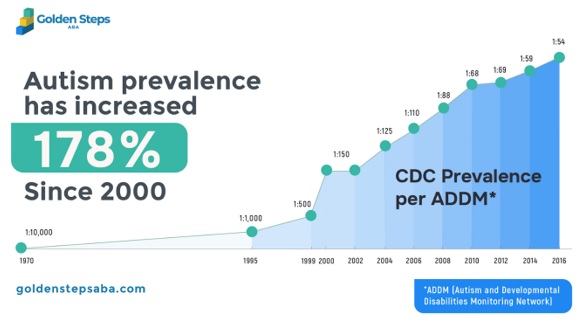Is Autism Hereditary? Understand The Connection Of The Development Of Autism With Family Tree
15th January 2024
Autism is a disorder that has become common in most of the children around the world. According to the Centers for Disease Control and Prevention (CDC), autism spectrum disorder is a neurodevelopmental disorder that affects approximately 1 in 36 children. It’s a kind of disorder in which various environmental and genetic factors come into play.
Many special needs teachers and parents are confused about whether autism runs in the family or it is hereditary. While there is no straightforward answer, according to much research if any family member has autism then it increases the risk of developing Autism Spectrum Disorder (AS) within the next generation.
According to goldenstepsaba.com, also it has been found that Autism spectrum disorder has increased by 178% since 2000.

Source: goldenstepsaba.com
Identifying autism's root cause within children is not easy but’s every special needs teacher and parents responsibility to figure it out.
For more clarity, we have written this blog post for you which will explore the hereditary nature of autism and how special needs teachers and parents can identify the early signs of autism in students.
Before moving to the topic, can we ask you a question? Do you follow us on Social Media? We regularly share upgraded educational content, tips, feedback, and more. Check us out by clicking the profiles here - Facebook / Twitter / LinkedIn / Pinterest / Instagram / YouTube
So, without any further delay, let’s get started.
Connection of Autism With Family Tree
While there is no singular autism gene that passes down from one generation to another. However, according to much research, it has been found that the ASD (Autism Spectrum Disorder) trait is a highly heritable component that could be found in running in a family which indicates there is a genetic link to some extent.
While we can see that ASD-related traits can be observed within the family tree the direct correlation with the immediate generation is not clear. Autism is a complex disorder conditions influenced by various genetic and environmental factors.
How Risk Factors Influences Autism?
Below we will explore how genetic and environmental factors influence autism disorder.
Genetic Risk Factor In Autism
According to many research, multiple genes cause the development of autism within individuals. The development of autism spectrum disorder within children is influenced by both inherited genes and genetic mutations. After various studies and research, it has been found that several gene variants are associated with autism such as- CHD8, PTEN, and SHANK3.
However, these gene variants are found in a very low percentage of autism cases, and genetic risk factors are the reasons behind autism which is still unknown.
Environmental Risk Factors in Autism
Environmental factors also influence the process of development of autism. Pre-natal and early life exposure to certain medications, conditions, or environments can increase the risk of development of autism in children. Factors like- air pollution, medication taken by the mother during pregnancy, and parent's age at conception, etc.
Both environmental and genetic risk factors influence the development of autism in children. However, there are other factors as well, and science is still searching and looking for solid and concrete factors.
How To Identify Early Signs Of Autism In Children?
It is very essential for both special need teacher sand parents to identify the signs of autism within children to prepare the required strategies to support them. Let’s get to know some of the early signs that your children with autism might be showing:
1. Not Willing To Socialize Much: Children with autism show little or no interest in socializing with their peers or even with their teachers and parents.
2. Sensitive To Sensory Activities and Environment: They have a very low tolerance for any sensory input, get disturbed easily by loud noises, and don’t like changes in the environment, etc.
3. Difficult to Communicate and Express: Children with Autism generally have a hard time forming their sentences and responding when their names are being called.
4. Obsessed or Fixated With Certain Objects: They get obsessed or fixated with certain objects or tasks without understanding their connection to the environment.
5. Poor Motor Skill: Children with autism may exhibit poor motor skills and coordination.
6. Don’t Like Changes: They have a hard time accepting any changes and find it challenging to adapt to any new situations.
Note: To know, how you can support better children with autism better to thrive in every aspect of life. You can read our blog here.
Identifying Signs of Autism In Children Is Necessary To Support Them Better
There is much speculation that autism runs in the family or it’s hereditary. To some extent, it’s true, because various genetic factors and environmental factors are the reason behind the development of autism. Those special needs teachers or parents who have completed autism awareness courses have better clarity on what factors contribute to the development of autism and how they can identify the signs in children.
However, in this blog post as well, we have shared various tips with which you can be able to identify early signs of autism within children to support them better so that they can thrive in every aspect of their lives.
So, start pursuing courses like the international teaching diploma in Bangalore today and understand your children with autism learning and other needs better to provide the required support and guidance.
We believe education should be accessible for everyone. That’s why we don’t charge for our blogs. Find the right course that will help you in your career with us, contact us at - 1800–212–6400. You can mail us at act@asiancollegeofteachers.com.
Written By : Abhishek
Leave a Reply

